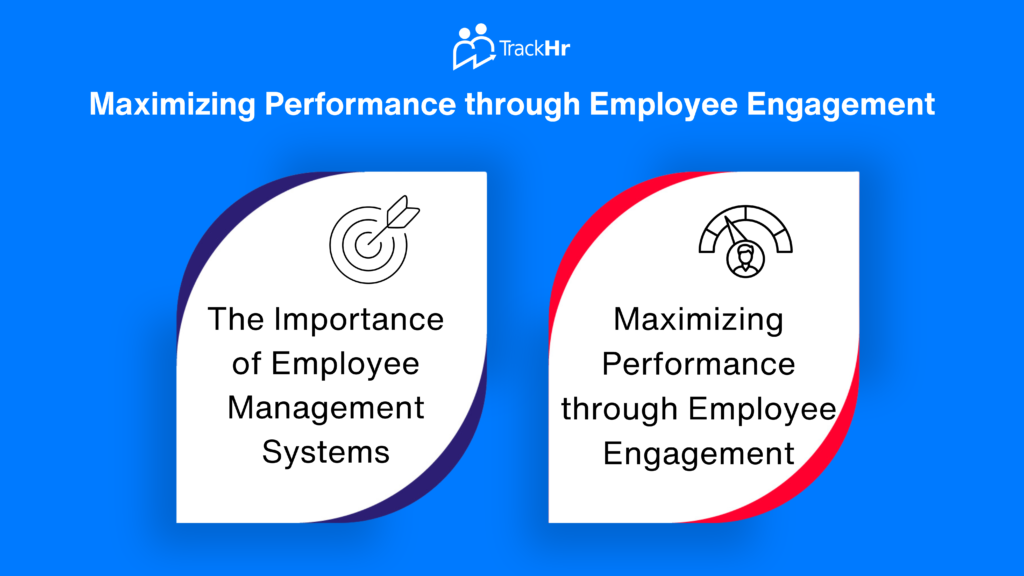Saturday, 14 May 2022
Maximizing Performance through Employee Engagement
Table of contents
- Introduction
- The Importance of Employee Management Systems
- Maximizing Performance through Employee Engagement
- Conclusion
Introduction
Employee engagement is the secret sauce to a thriving workplace. It’s all about capturing the hearts and minds of your employees, making them feel valued and motivated to give their best. But how can companies achieve this seemingly elusive goal? Well, one way is through the use of Employee Management Systems (EMS). These systems are designed to streamline HR processes and foster effective communication between employers and employees. By implementing an EMS, organizations can enhance employee engagement, boost performance, and ultimately drive success. So, let’s dive deeper into the importance of EMS and how they can revolutionize your workplace. Harness the power of employee engagement and watch your business soar!

The Importance of Employee Management Systems
Employee management systems streamline and automate various HR processes, from onboarding to performance evaluations, by providing a centralized platform for managing all HR-related tasks. This centralization eliminates the need for manual handling of paperwork and data, leading to a more efficient HR workflow.
Enhanced efficiency by automating administrative tasks:
- Payroll processing, leave management, and other repetitive administrative tasks are automated, saving time and reducing the likelihood of errors.
- HR professionals can focus on more strategic initiatives and employee-centric activities instead of getting bogged down in administrative work.
Improved data accuracy and security through centralized data management:
- By storing all employee data in a single secure system, the risk of data discrepancies and errors is minimized.
- Robust security measures protect sensitive employee information from unauthorized access, ensuring data privacy and compliance with regulations.
Employee engagement is crucial for a motivated and valued workforce:
- Engaged employees are more committed, productive, and enthusiastic about their work, leading to higher job satisfaction and retention rates.
- A motivated and valued workforce fosters a positive work culture and enhances overall organizational performance.
Employee management systems contribute to employee engagement by:
- Facilitating open and transparent communication:
- The system enables seamless communication between employees, teams, and management through features like company-wide announcements, instant messaging, and feedback mechanisms.
- Transparent communication fosters trust, inclusivity, and a sense of belonging among employees.
Providing access to important information and tools for continuous learning and development:
- Employee portals in the system allow employees to access essential information, such as company policies, benefits, and training resources.
- Continuous learning and development opportunities empower employees to improve their skills and grow within the organization, leading to higher engagement and loyalty.
In summary, employee management systems play a vital role in streamlining HR processes, improving data accuracy and security, and enhancing employee engagement. By automating administrative tasks and promoting open communication and continuous learning, these systems create a positive and efficient work environment that contributes to overall organizational success.
Maximizing Performance through Employee Engagement
Employee engagement is crucial for success and high-performance teams:
- Engaged employees are motivated, productive, and committed to their work.
- They have a sense of ownership and dedication to achieving their goals and the organization’s objectives.
Engaged employees go beyond their job descriptions:
- They willingly take on additional responsibilities and challenges.
- They are proactive and seek opportunities to contribute to the company’s success.
Employee management systems foster engagement and maximize the workforce’s potential:
- These systems provide tools and processes to measure and track employee engagement levels.
- By identifying areas for improvement, they help create strategies to boost engagement.
Regularly collecting feedback from employees through these systems:
- Employees feel valued and appreciated when their opinions and ideas are heard.
- Feedback helps address concerns and improve employee satisfaction.
Clear goal setting and expectations through employee management systems:
- Employees understand their roles and responsibilities better.
- This clarity reduces confusion and enhances focus on key tasks.
Regular feedback and recognition lead to employee growth and excellence:
- Employees receive constructive feedback to improve their performance.
- Recognition reinforces positive behavior and motivates employees to excel.
Employee management systems create a positive work environment:
- Employees feel supported, valued, and part of a cohesive team.
- This positive atmosphere encourages collaboration and cooperation.
Increased productivity and profits result from a thriving work environment:
- Engaged employees are more efficient, leading to higher productivity levels.
- Improved employee performance contributes to the organization’s bottom line.
In summary, employee engagement is vital for achieving high-performance teams. Employee management systems play a critical role in nurturing engagement by collecting feedback, setting clear goals, and providing regular recognition and feedback. Creating a positive work environment through these systems leads to increased productivity and ultimately, higher profits for the organization.
Conclusion
Employee management systems play a crucial role in maximizing performance through employee engagement. These systems ensure that employees are properly managed and their needs are met. By implementing employee management systems, organizations can improve communication, enhance productivity, and increase employee satisfaction.
One key point to remember is that employee engagement is directly linked to performance. Engaged employees are more likely to go above and beyond, contribute innovative ideas, and deliver outstanding results. Employee management systems provide the tools and resources needed to foster employee engagement.
Another important aspect is that employee management systems enable organizations to effectively measure and track employee performance. By using data and analytics, organizations can identify areas of improvement and take proactive measures to address them. This leads to continuous growth and development for both the employees and the organization.
